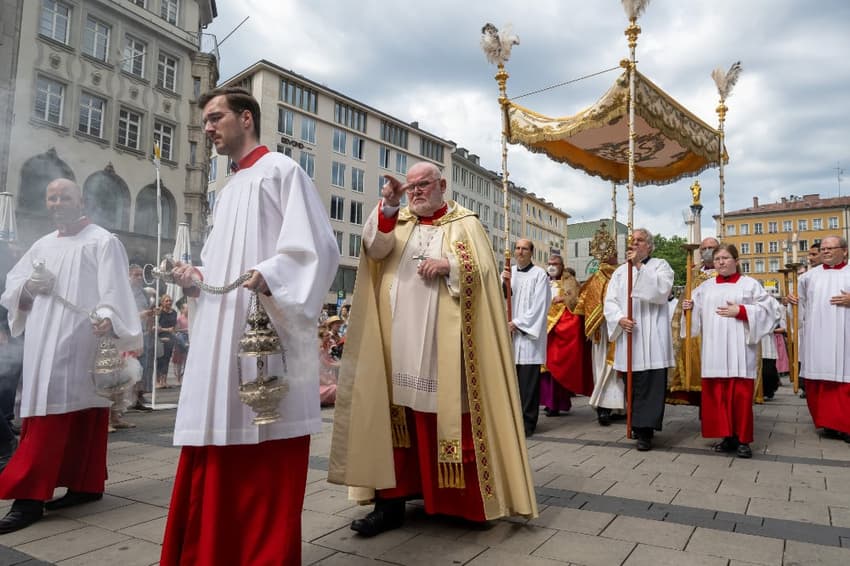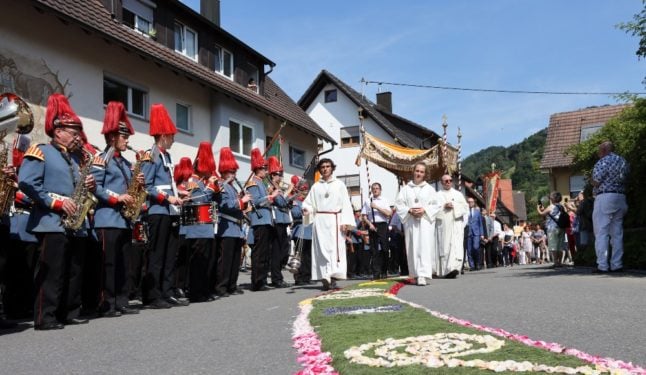Fronleichnam: What you should know about Germany’s public holiday in six states

The day is celebrated as a public holiday in six German states (and two other regions) on Thursday. We explain its origins and how it's observed.
Thursday June 8th 2023 marks the Catholic holiday of Fronleichnam, known sometimes as Prangertag or Blutstag. In English the simplified Latin term, Corpus Christi, or the Feast of the Body of Christ, is used.
Where and how is it celebrated in Germany?
The day is celebrated internationally on the Thursday after Trinity Sunday.
It's mostly celebrated where it is also a public holiday: the predominantly Catholic, southwestern states of Baden-Württemberg and Bavaria, as well as the western states of Hesse, North Rhine-Westphalia, Rhineland-Palatinate and Saarland.
Basically you'll have the day off work if you live in a part of Germany where Martin Luther didn't have an upper hand.
READ ALSO: When are Germany's state and national public holidays in 2023?
However, the holiday is also celebrated in other parts of Germany, such as in Sorbian communities. The West Slavic ethnic group lives in the eastern states of Brandenburg and Saxony, and the majority are Roman Catholics.
Celebrations of the holiday include a Holy Mass with the Eucharist, followed by a Fronleichnamsprozession (a Fronleichnam procession) led by a local Priest, during which praying and singing takes place.
This and the following barbecue is considered the Fronleichnamsfest (which is pronounced like froon-laich-naams-fest) and it greatly varies in size from town to town.
In Fritzlar in northern Hesse, the celebrations usually start on Wednesday night with the so-called Katzenkoppschießen. During this ceremony, the eight bells of the town cathedral are rung and a canon is fired, a ritual that is repeated three times.

A Fronleichnam procession taking place in the centre of Sipplingen, Baden-Württemberg in 2022. Photo: picture alliance/dpa | Oliver Hanser
In Cologne, there is usually a procession involving over 100 ships, while in Bamberg 18 men carry a huge cross through the town.
The parades are often highly decorated with ornate floral images with motives from the Bible. People who celebrate it usually decorate their houses with similarly elaborate designs and symbols, such as a Biblical fish.
What are its origins?
The word itself comes from the Middle-High German term vrône lîcham, meaning “Body of the Lord”. The term comes from the words vrôn (meaning “what concerns the Lord”) and lîcham (meaning body).
The variations of the word Fronleichnam also have their origins. Blutstag is comprised of the words “Blut” (meaning blood) and “Tag” (meaning day), so it literally means “Blood Day”. This makes sense as it celebrates the blood of Christ.
Prangertag, on the other hand, is a little more strange.
“Pranger” means pillory, which is a wooden framework with holes for the head and hands, and was used to imprison offenders during Medieval times.
However, “Pranger” in this case supposedly does not mean an ancient torture device. It is said to reference the thought that “die Natur prangert in ihrem herrlichsten Kleid” (nature denounces in her beautiful dress).
The only sense that can be made of this is that nature can be quite beautiful around this time of year.
But what actually is Fronleichnam?
Fronleichnam is the liturgical solemnity celebrating the presence of the blood and body of Jesus Christ in the elements of the Eucharist.
So essentially it celebrates Jesus and his role in elements of the commemoration of the Last Supper.
Uses of Fronleichnam:
Na? Gehst du gleich zum Fronleichnamsfest?
Well? Are you going to the Corpus Christi celebration?
Pfarrer Mustermann mag Fronleichnamsprozession besonders viel, hab’ ich gehört.
Father Mustermann likes Corpus Christi in particular, I have heard.
Comments (1)
See Also
Thursday June 8th 2023 marks the Catholic holiday of Fronleichnam, known sometimes as Prangertag or Blutstag. In English the simplified Latin term, Corpus Christi, or the Feast of the Body of Christ, is used.
Where and how is it celebrated in Germany?
The day is celebrated internationally on the Thursday after Trinity Sunday.
It's mostly celebrated where it is also a public holiday: the predominantly Catholic, southwestern states of Baden-Württemberg and Bavaria, as well as the western states of Hesse, North Rhine-Westphalia, Rhineland-Palatinate and Saarland.
Basically you'll have the day off work if you live in a part of Germany where Martin Luther didn't have an upper hand.
READ ALSO: When are Germany's state and national public holidays in 2023?
However, the holiday is also celebrated in other parts of Germany, such as in Sorbian communities. The West Slavic ethnic group lives in the eastern states of Brandenburg and Saxony, and the majority are Roman Catholics.
Celebrations of the holiday include a Holy Mass with the Eucharist, followed by a Fronleichnamsprozession (a Fronleichnam procession) led by a local Priest, during which praying and singing takes place.
This and the following barbecue is considered the Fronleichnamsfest (which is pronounced like froon-laich-naams-fest) and it greatly varies in size from town to town.
In Fritzlar in northern Hesse, the celebrations usually start on Wednesday night with the so-called Katzenkoppschießen. During this ceremony, the eight bells of the town cathedral are rung and a canon is fired, a ritual that is repeated three times.

In Cologne, there is usually a procession involving over 100 ships, while in Bamberg 18 men carry a huge cross through the town.
The parades are often highly decorated with ornate floral images with motives from the Bible. People who celebrate it usually decorate their houses with similarly elaborate designs and symbols, such as a Biblical fish.
What are its origins?
The word itself comes from the Middle-High German term vrône lîcham, meaning “Body of the Lord”. The term comes from the words vrôn (meaning “what concerns the Lord”) and lîcham (meaning body).
The variations of the word Fronleichnam also have their origins. Blutstag is comprised of the words “Blut” (meaning blood) and “Tag” (meaning day), so it literally means “Blood Day”. This makes sense as it celebrates the blood of Christ.
Prangertag, on the other hand, is a little more strange.
“Pranger” means pillory, which is a wooden framework with holes for the head and hands, and was used to imprison offenders during Medieval times.
However, “Pranger” in this case supposedly does not mean an ancient torture device. It is said to reference the thought that “die Natur prangert in ihrem herrlichsten Kleid” (nature denounces in her beautiful dress).
The only sense that can be made of this is that nature can be quite beautiful around this time of year.
But what actually is Fronleichnam?
Fronleichnam is the liturgical solemnity celebrating the presence of the blood and body of Jesus Christ in the elements of the Eucharist.
So essentially it celebrates Jesus and his role in elements of the commemoration of the Last Supper.
Uses of Fronleichnam:
Na? Gehst du gleich zum Fronleichnamsfest?
Well? Are you going to the Corpus Christi celebration?
Pfarrer Mustermann mag Fronleichnamsprozession besonders viel, hab’ ich gehört.
Father Mustermann likes Corpus Christi in particular, I have heard.
Join the conversation in our comments section below. Share your own views and experience and if you have a question or suggestion for our journalists then email us at [email protected].
Please keep comments civil, constructive and on topic – and make sure to read our terms of use before getting involved.
Please log in here to leave a comment.